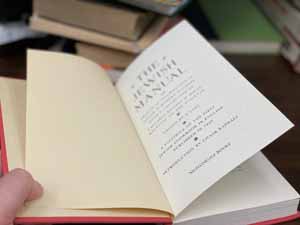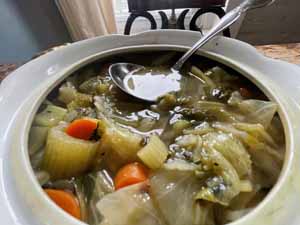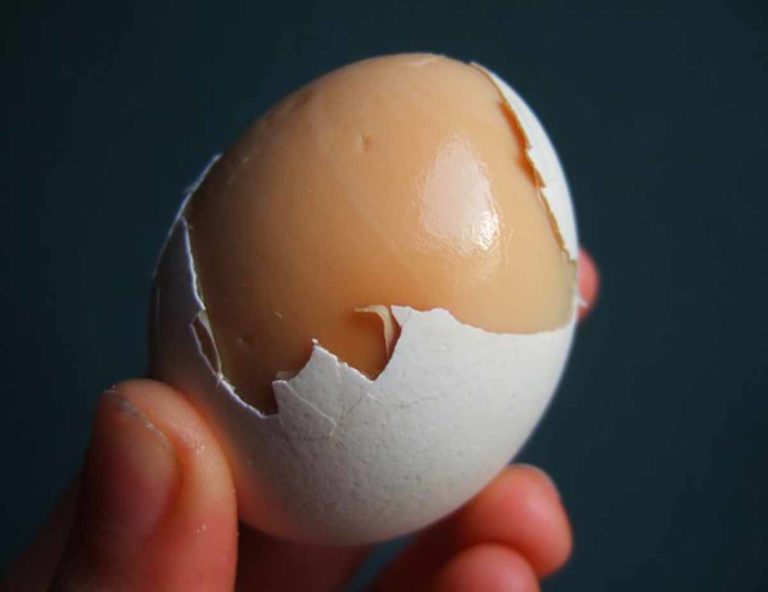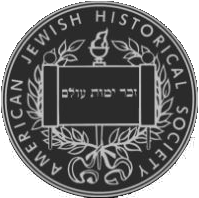“Maigre” is a phonetic spelling of the French “maigre,” or “meager,” referring to a soup’s lack of meat. A meager soup. This recipe for the titular soup is from The Jewish Manual, or Practical Information in Jewish & Modern Cookery with a Collection of Valuable Recipes & Hints Relating to the Toilette, the oldest known English-language Jewish cookbook. The first edition was published in London in 1846, its authorship credited to “a Lady,” thought by some to be Lady Judith Montefiore.

Setting the standard for the Jewish cookbook authors who would follow her, this mysterious “Lady” emphasized that keeping a kosher table did not constitute being stuck in the past; Jewish cuisine could and would evolve, which she proved via her Kosher adaptions of fashionable dishes.
According to Chaim Raphael’s introductory essay to a modern reprint, in the 1840s there were about 30,000 Ashkenazic German Jews and Sephardic Jews in England, two-thirds of whom lived in London. Some of these families had been in the UK since the 17th century. The Jewish Manual thus suited these old, often wealthy families, not to mention social climbers who aspired to their status.
The authoress lays out the origins of her selected recipes in the books’ preface:
“Our collection will be found to contain all the best recipes, hitherto bequeathed only by memory or manuscript from one generation to another of the Jewish nation, as well as those which come under the denominations of plain English dishes; and also such French ones as are now in general use at all refined modern tables.”
In addition to her French and English recipes, the author included traditional German and Dutch recipes; and even recipes for game birds and venison. According to historian Barbara Kirshenblatt-Gimblett, wealthy Jewish families would have “a ritual slaughterer accompany [them] on hunting expeditions,” so that game could be killed under the laws of kashrut. In the back of the book are cosmetic recipes and advice. An “old Roman recipe for improving the skin” calls for “half a pint of fresh asse’s milk;” and a lip balm recipe requires spermaceti, a substance harvested from the skull of a sperm whale.
As I flipped through reprint edition of the book in the AJHS historic cookbook collection, a recipe for a spring vegetable soup called “Soup Maigre” caught my eye. I was familiar with the recipe; I had come across a version of it in Mark Zanger’s The American History Cookbook. Zanger’s “Soup Meagre,” pulled from an early 18th-century American manuscript, is a mix of early spring greens and fresh peas. Its presence in this Jewish cookbook caught my attention because Zanger noted that Soup Meagre was a meat-free soup intended for the fast days of Lent. A Catholic Lenten soup, however, works just as well for a kosher meal!

Here is the recipe for Soup Maigre, as presented in The Jewish Manual:
“Chop 3 lettuces, a large handful of spinach, a little chervil, a head of celery, two or three carrots, and four onions, put them on the fire with half a pound of butter, and let them fry till slightly browned, seasoned with a little salt, sifted white sugar, and white pepper, stew all gently in 5 pints of boiling water for about 2 hours and a half, and just before serving the soup, thicken it with the beating yolks of four eggs, mixed first with a little of the soup and then stirred into the remainder.”
As nervous as I was about boiling lettuce for two and a half hours, I resolved to follow the recipe to the letter. As it cooked, the soup smelled like the warm, limp lettuce on the top of a take-out hamburger. But when I tasted it, I was impressed; it wasn’t as awful as I’d thought it would be. It was certainly buttery, and the lettuces had a decent texture; but to me, the whole mess tasted like burnt lettuce. That said, I’ve noticed that sometimes when I spend a day on a dish, I experience it differently than those who only encounter it in its final form.
So, I paid a few calls, and delivered tupperwares of soup to my neighbors’ doorsteps. And, they loved it. All of them adored this soup. One said it was hearty, another found it comforting, like something his grandmother would make. So you’ll have to decide for yourself! Below, is my adapted recipe for the 1846 Soup Maigre. And below that, I’ve included a recipe for my own Soup Meagre variation, which is my preferred early spring soup.
Soup Maigre
Ingredients
- ½ pounds (two sticks) unsalted butter
- 4 small or two large onions, chopped
- 2 large carrots, chopped
- 1 head of celery, chopped
- ½ bunch chervil or parsley, chopped
- 1 large handful spinach
- 3 lettuces (I chose cabbage, iceberg and romaine), chopped
- 2 tsp salt
- 1 tbsp sugar
- 2 tsp white pepper
- 2 egg yolks
Directions
- Add the butter, onions, carrots, celery, parsley, spinach, and lettuces–in that order–to a large stock pot.
- Cook over medium high heat for 15 minutes, stirring vigorously every 5 minutes.
- Turn heat to low. Add 10 cups water, salt, sugar and white pepper; and stir.
- Cover and simmer for two and a half hours.
- Slowly add 1 cup of the soup to the egg yolks while whisking constantly.
- Add the yolk mixture to the soup, stirring constantly, until the soup thickens slightly, about 10 minutes.
- Serve.
Sarah’s Soup Meagre
From the Ashfield Family manuscript, c. 1749; adapted from The American History Cookbook by Mark Zanger.
Ingredients
- ½ pound (two sticks) butter
- 2 large onions, chopped
- 3 handfuls sorrel (or three handfuls spinach and 2 tbsp lemon juice)
- 1 handful parsley, chopped
- 1 cabbage, chopped
- Any other early spring greens you like: dandelion, lamb’s quarter, arugula, baby kale, etc.
- Peas, fresh or frozen
- 3 whole cloves
- Salt & pepper
Directions
- Melt butter in a large pot over medium heat.
- Add onions and cook until translucent.
- Add 3 quarts water, sorrel/spinach, parsley, cabbage, other greens, cloves, salt and pepper to pot.
- Simmer over medium-low heat until cabbage is tender but not limp, 30-45 minutes.
- Add peas and simmer for another 5-10 minutes until tender.
- Serve with buttered hunks of bread.
- Enjoy!







